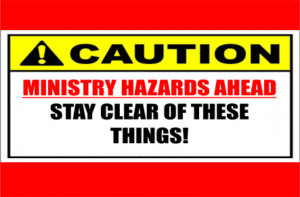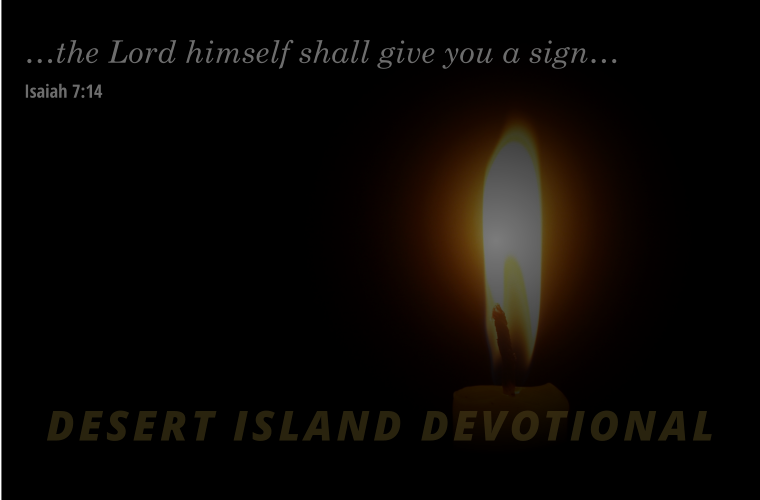Editors Note: This article was originally posted in 2012. It has been archived for quite a while, but it’s applicability and timing is appropriate for re-posting now, with a few minor editorial changes. Note that a comment was carried over from the original posting.
A number of years ago, the “No Fear” slogan began to appear on t-shirts, on back windows of pick-up trucks, in video games, on bracelets and necklaces, and in other more personal ways. The slogan still appears often, with variations such as “ain’t scared”, and has permeated itself into an attitude, lifestyle, or sub-culture, especially for teenagers and young adults.
The “no fear” attitude has not been limited to the secular segment. Its message of “I can do whatever I want and no one’s going to stop me” has infiltrated the Church. In many ways, as Christians with the justification of grace, some have crossed the line into areas that in times past would have been considered off-limits and a poor testimony for Jesus Christ. There are those who stake their claim to being “fearless” and allow sin to become acceptable practice in their pursuit of “God’s will” for their lives. The concept of holiness is lost amid the fearless (and might I boldly say self-gratifying?) pursuit of their goals.
Let me be perfectly clear on this issue – whether there is any fear or not – sin is never an acceptable behavior.
Being bold for God does not mean that you can be utterly fearless. A willingness to go to the extreme for Jesus isn’t justification for living without the fear of God in your life. Just because you are radically saved doesn’t mean that you have the liberty to live any way that you want without any fear of consequences.
For truth, every Christian needs the fear of God in his/her life. Without the fear of God, we risk serious consequences.
Although God has not given us the spirit of fear (2 Timothy 1:7), He does expect us to have a healthy attitude of fear regarding His position as Judge of the entire universe:
13 Let us hear the conclusion of the whole matter: Fear God, and keep his commandments: for this is the whole duty of man.
14 For God shall bring every work into judgment, with every secret thing, whether it be good, or whether it be evil.
You might say. “that’s Old Testament theology” and that’s OK, because “Old Testament theology” is still part of the whole Word of God and still applies to born-again Christians who are saved by grace. In fact, the concept of “fearing God” is mentioned not only in the Old Testament many times, it is specifically mentioned in the New Testament as well.
Paul, in his letter to the Romans, in a description of the unrighteousness of man cited the lack of a fear of God:
10 As it is written, There is none righteous, no, not one:
11 There is none that understandeth, there is none that seeketh after God.
12 They are all gone out of the way, they are together become unprofitable; there is none that doeth good, no, not one.
13 Their throat is an open sepulchre; with their tongues they have used deceit; the poison of asps is under their lips:
14 Whose mouth is full of cursing and bitterness:
15 Their feet are swift to shed blood:
16 Destruction and misery are in their ways:
17 And the way of peace have they not known:
18 There is no fear of God before their eyes.
In his letter to the church in Corinth, Paul exhorted the Corinthian believers to live pure lives in the fear of God:
Having therefore these promises, dearly beloved, let us cleanse ourselves from all filthiness of the flesh and spirit, perfecting holiness in the fear of God.
In Ephesians, after Paul lists a number of sinful practices to abstain from, he encourages the Ephesian church to live joyfully in the fear of God:
19 Speaking to yourselves in psalms and hymns and spiritual songs, singing and making melody in your heart to the Lord;
20 Giving thanks always for all things unto God and the Father in the name of our Lord Jesus Christ;
21 Submitting yourselves one to another in the fear of God.
Peter challenges Christians to be obedient to all authority and to “Fear God” while honoring those other authorities that God has allowed to be placed before them:
15 For so is the will of God, that with well doing ye may put to silence the ignorance of foolish men:
16 As free, and not using your liberty for a cloke of maliciousness, but as the servants of God.
17 Honour all men. Love the brotherhood. Fear God. Honour the king.
Finally, in John’s account of the Revelation of Jesus Christ, we are shown his vision of an angel with the everlasting gospel preaching:
6 And I saw another angel fly in the midst of heaven, having the everlasting gospel to preach unto them that dwell on the earth, and to every nation, and kindred, and tongue, and people,
7 Saying with a loud voice, Fear God, and give glory to him; for the hour of his judgment is come: and worship him that made heaven, and earth, and the sea, and the fountains of waters.
From the above passages as well as many others, I submit that it is important that we demonstrate a healthy attitude of the fear of God.
Why Fear God?
Fearing God doesn’t mean that we live in fear of God Himself. On the contrary, we live our lives in a manner that provides evidence that we acknowledge God for who He is and with a respect for His position. We love God and have fellowship with Him as a Father. Much like we should respect and honor our earthly fathers (which is something that has been seemingly lost in today’s culture – but that’s another story), we show that respect and honor to God through the way that we live bearing the name of His Son.
Not only does a Christian’s fear of God show love and honor to God, it also brings the following benefits:
- Knowledge (Proverbs 1:7)
- Wisdom (Proverbs 9:10)
- Prolonged days (Proverbs 10:27)
- Confidence (Proverbs 14:26)
- Contentedness (Proverbs 15:16; 19:23)
- Protection from evil (Proverbs 16:16; 19:23)
- Honor (Proverbs 22:4)
- Blessings in life (Proverbs 19:23)
- God’s mercy (Psalms 103:11 and 17)
How Do I Fear God?
Here are a few ways that the fear of God is evidenced in our lives:
1. Obedience
I believe that obedience is the first indicator of love and honor, as well as the fear of God. In John’s account of the gospel, Jesus spoke the following:
If ye love me, keep my commandments.
In fact, God prefers obedience to any other sacrifice we may be willing to offer:
22 And Samuel said, Hath the LORD as great delight in burnt offerings and sacrifices, as in obeying the voice of the LORD? Behold, to obey is better than sacrifice, and to hearken than the fat of rams.
23 For rebellion is as the sin of witchcraft, and stubbornness is as iniquity and idolatry. Because thou hast rejected the word of the LORD, he hath also rejected thee from being king.
When a Christian is seen living in obedience to God’s Word, the world recognizes a difference in behavior that comes from honoring and loving God. That difference is indicative of a person who recognizes that that doing what God says is an important way to please God.
Less visible are the ways we obey God with respect to our relationship with Him. Things like spending time in prayer, studying His Word, and allowing the Holy Spirit to direct our lives are all indications of our fear of God.
We should obey God because it shows our love toward God and demonstrates our fear of God. It establishes a foundation for His blessings and mercies upon our lives. In other words, we obey because we love God, we want to please Him and we fear displeasing Him with our disobedience.
2. Conversation
The second indicator of a fear of God is in our conversation.
3 And he hath put a new song in my mouth, even praise unto our God: many shall see it, and fear, and shall trust in the LORD.
Conversation is another key indicator of our fear of God. By conversation, I mean what we spend our time talking about, how we talk, and the words we use to convey our thoughts and feelings. I believe more than anything else, Christians have allowed their conversation to become more like that of the world and less like what would please God. Also, I believe that this results from a fear of the world’s acceptance rather than a fear of God.
Consider the following:
- How often are Christians openly thanking God for their food when eating in public, especially at fast food restaurants? I’ve heard all kinds of excuses, including “it’s (insert the name of a fast food chain), so it’s not really food”. Regardless of the source or even the quality of the food, shouldn’t we still be thankful to God for it?
- When was the last time you heard someone say “Praise the Lord!” because of a blessing they received at school or work… or even at home? Sometimes, we will shout at church, but it’s a great rarity to hear any acknowledgment of God in public.
- How many times have you used (or heard another Christian use) slang, profanity, or off-color language in an effort to “fit in” with those around? Or, maybe for the sake of humor, have you (or perhaps a friend) passed on a not-quite-appropriate joke, video, or photo by email?
- When considering how you describe other people, how much of your conversation is positive and how much is negative?
Those are just some things to consider about conversation. I believe if we truly love and fear God, we would be more careful about how we speak. After all, He is always listening.
If any man among you seem to be religious, and bridleth not his tongue, but deceiveth his own heart, this man’s religion is vain.
3. Deeds
Another indication of our fear of God is found in the deeds we do.
Serve the LORD with fear, and rejoice with trembling.
By “deeds” I mean our service – the works we do to serve God. It amazes me how many Christians are not involved in God’s work. It seems that there is always something better to do than to be busy serving God. I realize that we have our school obligations, our work obligations, and our family obligations. But, every Christian should still make time for serving God.
For many Christians, serving God means attending the weekly church “service”. But, it goes way beyond attending church, although that is an important place to start. Serving God includes witnessing to friends, helping in ministry activities, encouraging others, participating in tithes and offerings, and the list goes on and on.
Our service honors and glorifies God, it shows others that God is important to us and that we want to please God. Also, serving God with fear will bring us joy in knowing that we are pleasing Him.
4. Testimony
One of the best indicators of our fear of God is through our personal testimony.
Let my heart be sound in thy statutes; that I be not ashamed.
The fear of God is demonstrated through our personal testimony for the Lord – the way we live and act, and how we witness for God to others. Although Christians have been commanded to be a witness (Matthew 28:19-20 and Mark 16:15), the great majority of us seldom take the time to share our faith with others.
We have also been told to be salt and light to this world:
13 Ye are the salt of the earth: but if the salt have lost his savour, wherewith shall it be salted? it is thenceforth good for nothing, but to be cast out, and to be trodden under foot of men.
14 Ye are the light of the world. A city that is set on an hill cannot be hid.
15 Neither do men light a candle, and put it under a bushel, but on a candlestick; and it giveth light unto all that are in the house.
16 Let your light so shine before men, that they may see your good works, and glorify your Father which is in heaven.
Our testimony should be obvious and our witness should be strong. Yet, we oftentimes blend in and the world doesn’t see a difference.
I believe that if we loved and honored God, with a healthy attitude of fear, we would be much more active in our efforts to reach others with the gospel. We would not be afraid of soul-winning. Rather, we would fear the consequences of not telling others about the hope of Jesus Christ.
5. Recreational activities
Fear of God is also indicated through our recreation.
Whether therefore ye eat, or drink, or whatsoever ye do, do all to the glory of God.
Whether we want to admit it or not, many of us lead double lives and we don’t even recognize it. We are who we are at church, and then we are who we are at leisure. The truth is, in both cases, we are who we are. As our settings change, our values change without us realizing it. After all, our leisure time is our time, right? And no one would really expect us to have the same values while playing a video game as we do at church…?
Our recreational activities may be the area where we most lack a fear for God. What we do in our “free” time is often flesh-pleasing and not so much God-pleasing. I could list a number of activities for each of us to consider, but I’ll leave that to for self-evaluation at another time. I believe that we all (yes, all of us) could demonstrate a better fear of God in this area.
6. Character/Integrity
Finally, fear of God is indicated through our character.
But the LORD said unto Samuel, Look not on his countenance, or on the height of his stature; because I have refused him: for the LORD seeth not as man seeth; for man looketh on the outward appearance, but the LORD looketh on the heart.
Our character and integrity demonstrate our fear of God. While everything that I mentioned previously provides outward evidence of a Christian’s fear of God, the true indicator of the fear of God is one’s character or integrity. Character and integrity are often interchanged, and refer to a state of moral soundness that goes beyond superficial and is rather embedded in one’s heart.
When describing character and integrity, youth leaders often refer to “what one does when no one else is around.” Holding to this description, it is easy to see how character and integrity demonstrate a fear of God. When we have the right kind of character and integrity, we’ll have the right kind of heart, and we will do the things that honor and glorify God, no matter who is or isn’t watching. After all, God is always watching, right? Keep that in mind and know that whatever’s done alone in darkness – what we watch, read, see on the internet, etc. – all of these things are a measure of our fear of God.
Summary
In the midst of a world gone “haywire”, a world that has lost its fear of consequences, we must continue to demonstrate a fear of God. We must have a fear that comes from our love and respect for God, recognizing that He is just and holy.
If you have a “no fear” attitude, maybe you should think twice about that!

















Excellent synopsis on the fear of God. Facing persecution, the early Church members turned to prayer. This is the beginning of a prayer that is based on Psalm 2: “And when they heard that, they lifted up their voice to God with one accord, and said, Lord, thou art God, which hast made heaven, and earth, and the sea, and all that in them is:” (Acts 4:24)
It is a prayer that is remarkable for the way in which it seeks to glorify God, and for its unselfish nature. Notice that the Apostles did not ask God to change their circumstances.
“And now, Lord, behold their threatenings: and grant unto thy servants, that with all boldness they may speak thy word,: (Acts 4:29)
Like young people facing the threat of ridicule, peer pressure, or being ostracized, they had to face their fear of man in light of their fear of God.
Instead of asking God to change their circumstances, they asked Him to change their reaction to the circumstances. I love this submission to God’s power and providence. The Greek word translated as “Lord” in Acts 4:24 is “despotes,” what we would call a “despot” or “tyrant.” How often do we humble ourselves before Christ as our LORD, and not just as our mechanic, doctor, therapist, or ATM machine?